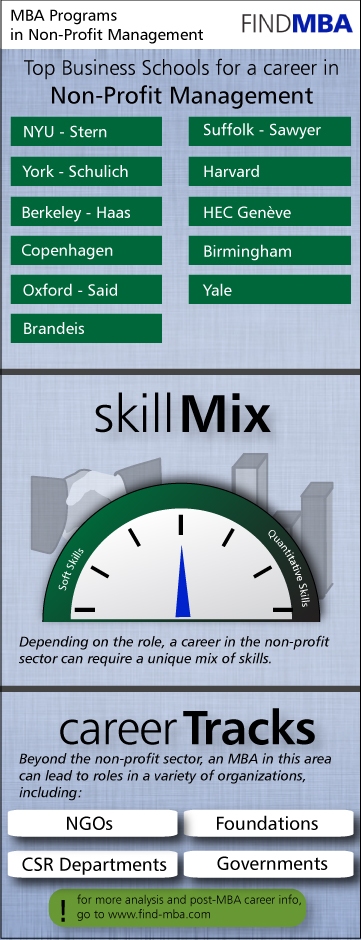Before deciding to do an MBA, Suzi Tart worked as a journalist in China for about five years. There, she was exposed to the positives that economic development had on the country, but she also saw the dark underbelly of that growth: the environmental problems, the rising inequality, and other impacts that she witnessed on a daily basis. So when she decided to return to school, she wanted to find a way to enact change, but also was looking for skills that would help her land a job.
“I wanted a socially-conscious MBA program that would allow me to gain the skills needed in order to be a part of the change, but would also open doors for me,” Tart says.
Tart chose to do the International Organizations MBA (IOMBA) at the University of Geneva, a ten-month program that promises to help students who want to go beyond “business as usual” by preparing them for management careers in NGOs and other international organizations.
Now six months into the program, Tart – who is concurrently pursuing a master's degree in international development from the University of Pittsburgh – says that she enjoys that she has been able to connect with a group of people who have similar ambitions as she does.
“We all have the same goal of leaving the world a little bit better than how it was when we first came into the program,” she says.
For those who want to make the world a little better, there are a growing number of MBA programs that can help. There are general MBA programs with concentrations in corporate social responsibility (like the one offered by the UK's Nottingham University, for instance) or sustainability (Switzerland's St. Gallen University offers several tracks in this area). Furthermore, there are MBA programs specifically designed for those who want to work in non-profit companies, including Brandeis' Heller MBA in Nonprofit Management, or the MBA/Nonprofit degree from Suffolk University's Sawyer Business School.
Other programs, like Boston University's Public and Nonprofit MBA, find common ground in the intersection between the public sector and the non-profit industry. Along these lines, some policy-minded students choose to pair an MBA program with a second master's degree in public policy (MPP) or public administration (MPA).
“Non-profit organizations have to be run like businesses”
Sandy Matava, who teaches on Sawyer Business School's MBA/Nonprofit program, says that managing a non-profit organization is very similar to managing a for-profit business, but with a few differences that can be addressed by a specialized program. She says that “non-profit organizations have to be run like businesses.” They need to be efficient and generate revenue, just like for-profit businesses.
“In the for-profit world you are trying to create value for your shareholders,” says Matava, “and in the not-for-profit world, you still want a profit because then you can spend more money carrying out your mission.”
Likewise, traditional for-profit businesses have a fairly straightforward way of judging the success of particular business strategies or tactics: the bottom line.
In the private sector “the key performance indicators are normally linked to the results,” says Monica Patry, IOMBA's program director, “so you need to sell a product, and the key performance indicator is how much you make. It's very easy to see.”
However, “in international organizations and NGOs, you don't have these key performance indicators, but you need to find other ones, so that when a donor gives money, you can say 'here are your results.'”
To address these and other issues relevant to mission-oriented organizations, MBA programs in this space bridge the gap by combining core business classes with some specialized curriculum. For instance, the curriculum in the One Planet MBA at the University of Exeter Business School includes modules in Economics, and Managing Strategic Resources and Operations, but also covers topics in Finance and Responsible Investment, and The Human Factor in Sustainable Organisations.
 Value beyond the sector
Value beyond the sector
Typically, MBA programs in this space draw a wide audience. For instance, Sandy Matava says that the people who pursue Suffolk's MBA/Nonprofit program range from those who have already worked in the non-profit sector, to those who are interested in transitioning to it, and even those who want to end up working in the private sector. For the latter group of students, a specialized degree in non-profit management can add value to their careers in indirect ways.
“As they climb up the corporate ladder,” Matava says, “they often need to think about their philanthropic résumé, which means they have to be willing to provide some service to the community, and frequently that's done by serving on boards of directors of non-profit organizations.”
“And it's valuable for them to know about how non-profit organizations operate, and think about how they can make a contribution.”
Sometimes, the degree can take graduates seemingly as far away from the non-profit sector as possible.
“A number of our non-profit folks end up working in banks,” Matava says – but in their charitable foundations.
Additionally, students can find that a specialized degree can help if they want to work in corporate social responsibility (CSR) functions inside of for-profit companies.
Location matters
For many students who pursue these types of MBA programs, location can be important for networking and connecting with potential post-MBA employers. For instance, Suffolk's Boston location is a good place to be for those interested in a career in a non-profit or mission-driven organization. Boston is also home to many hospitals and health organizations, many of which are classified as non-profits, and can serve as popular post-MBA employers.
“One of the best aspects of the program is the location – Geneva itself,” Suzi Tart says of the IOMBA program. Geneva is home to the European headquarters of the United Nations, the World Economic Forum, the World Health Organization, and countless other NGOs and international organizations.
“It offers so many opportunities with the chance to make an impact,” Tart says.
And indeed, she has been interning with UN Conference on Trade and Development, in the organization's CSR division.
“It's been a great experience,” she says.“I've learned a lot, and I've learned that there are people out there who do want to make a difference, and it really just takes everybody getting together and talking.”
Photo: M. Filtz










